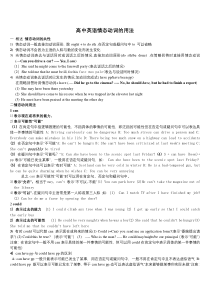 DOC
DOC
【文档说明】高中英语情态动词的用法讲解及练习(含答案).doc,共(15)页,172.500 KB,由小赞的店铺上传
转载请保留链接:https://www.doc5u.com/view-418ceb0800b7a45d4de7ef01564d0988.html
以下为本文档部分文字说明:
高中英语情态动词的用法一概述情态动词的共性1)情态动词一般直接加动词原形,除ought+todosth.在否定句或疑问句中to可以省略2)情态动词不会因为主语的人称与数的变化而发生变化3)当情态动词表达与说话同时或说话之后的情况,直接加动词原形(dosth/bedone).在简
略回答时直接用情态动词(---Canyoudriveacar?----Yes,Ican)(1)Shesaidhemightcometothefarewellparty(表达说话之后的情况)(2)Shetoldmethathemustbeill,fo
rhisfacewaspale(表达与说话同时情况)4)当情态动词表达说话时已发生的情况,加动词完成式(havepp/havebeenpp)在简略回答时用情态动词+have(----Didhegotothecinema?----No,hesh
ouldhave,buthehadtofinishareport)(1)Shemayhavebeenthereyesterday(2)Sheshouldhavecometohisrescuewhenhewastrappedintheeleva
torlastnight(3)Hemusthavebeenpraisedatthemeetingtheotherday二情态动词用法1can1)表示现在或将来的能力,2)表示可能性“可能”(1)在肯定句中指逻辑推理的可能性,不指具体的事情的可能性,即泛
指的可能性但在否定句或疑问句中可以表达具体一件事情的可能性A:DrivingcarelesslycanbedangerousB:ToomuchstresscandriveapersonmadC:EverybodycanmakemistakesinhislifeD:The
rebeingtoomuchsnowonahighwaycanleadtoaccidents(2)在否定句中表示“不可能”A:Hecan’tbehungryB:Shecan’thavebeencriticizedatlastweek’s
meetingC:Shecan’tpossiblybetired(3)在疑问句中表示“可能吗?”A:CanshehavebeentothescenicspotlastFriday?(4)S+canhave(been)+pp表示“可能已发生某事”,一般用在否定句或疑问句
,如:CanshehavebeentothescenicspotlastFriday?(5)在肯定句中还可以表示“有时可能”A:ScotlandcanbeverycoldinwinterB:Heisabad-temperedguy
,buthecanbequitecharmingwhenhewishesC:Youcanbeveryannoying总之can表示可能性“可能”时可以用在肯定句、否定句和疑问句中。3)表示“允许”,相当于may,can’t表示“不可以,不能”(1)Youcanpar
khere(2)Hecan’ttakethemagazineoutofthelibrary4)表示“可以”,在疑问句中主语常是第一人称或第三人称如:(1)CanIwatchTVafterIhavefinishedmyj
ob?(2)Canhedomeafavorbyopeningthedoor?2could1)表示过去的能力(1)IcouldclimbanytreewhenIwasyoung(2)IgotupearlysothatIco
uldcatchtheearlybus2)表示过去的可能性(1)Hecouldbeverynaughtywhenhewasaboy(2)Shesaidthathecouldn’tbehungry(3)Shetoldmethathecoul
dn’thavelefthere3)有时could可以代替can表示现在或将来的情况(1)Could(=Can)yousendmeanapplicationform?(表示“委婉提出请求”)(2)Couldthisbetrue?(表示“可能”)(3)----Whois
theman?----Hecould/may/might/beourprincipal(表示“可能”)注意:在肯定句中一般不用can表示具体的某一件事情的可能性,但可以用could在肯定句中表示具体的某一件事情的可能性)4)canhavepp与couldhavepp的区别A:canhav
epp一般只能表示可能已发生了某事,用在否定句或疑问句中,一般不用在肯定句中且不表达虚拟语气B:couldhavepp既可以表示可能已发生了某事,等于canhavepp,也可以表达虚拟语气“本来能够做某事但实际未做”注意:当主句的谓语动词是过去式时,那么从句在表示可能已
发生了某事时,只能用couldhavepp如:Hesaidthatshecouldn’thavecommittedsuicide3may1)表达“可以”在疑问句中主语常用“I”(1)MayIhaveyourattention,please?(2
)MayIhaveyourname?(3)YoumaywatchTVafteryouhavefinishedyourhomework(4)Youmaycomeifyouwish(5)Dogsmaynotbetakeninto
thehouses2)在肯定句表示“可能”,常指根据具体的已知的信息,表达具体的某一件事情的可能性。如果表示说话同时或之后的情况用maydosth;如果表示说话时已发生的情况用mayhave(been)pp;如果表示说话时正在发生的情况用maybe+doing;如果表示过去
某一具体的时间正在发生的情况用mayhavebeendoing在否定句中表示“可能不”,在表示“可能”时,一般不用在疑问句中(1)Hisfaceispale;hemaybeill(2)---Whoisthemanspeakingtoourfather?----Hemay
beournewheadmaster(3)Hisroomisdark;hemayhavegoneoutforadrive/walk/swim/rest(4)---Whereisthegeneralmanager?-
--Hemayhaveseenthedoctor,forhehascaughtabadcold(5)HemayhavebeenwatchingTVatninelastnight(6)Shemaybecommentingonthenewlyreleasedfi
lmnow3)may在sothat/inorderthat+目的状语从句中表达“可以”如:Heworkshardinorderthathemaybeadmittedtothatfamouscollege4
)may在让步状语从句中表达“可能”(1)Nomatterwhatyoumayhavedone,Ihavenointerest(“mayhavedone”从句谓语动词所表示的时间明显在主句所表示的时间之前)(2)Whoeveryoumaybe,hewon’tletyouin(“maybe”从句谓
语动词所表示的时间与主句所表示的时间同时)(3)动词原型+what+S+may,+主句A:Costwhatthebookmay,I’lltakeit(不管这书花多少钱,我都买)B:Comewhatmay,I’lltakethesideofyou(不管发生什么事,我都支持你)
5)may在祝愿语中的用法,May+主语+动词原型!(1)Mayyousucceed!(=Wishyousuccess)(2)Mayallofyoubehappy!(=Wishallofyouhappiness!)6)may在常用句型中的用法,(1)S+maywelldosth(很可能)
如:Shemaywelldropinforsometeaonherwaytowork(2)S+may/mightaswelldosth(不妨做某事,表示与说话同时或之后的情况)如:Wemayaswellstayathom
ewatchingTVtonight(3)S+may/mightaswellhavepp(不妨做某事,表示说话时已发生的情况)如:Youmayaswellhavegoneonanoutinglastweek,butyoujuststayed
athomedoingnothing(4)Iwishtodosth,mayI?4mightmay的过去式,一般表示过去的情况1)“可以”(1)IaskedtheactingmanagerifImightgohomeha
lfanhourearliertoday(2)Heaskedmeifhemightusethephone2)“可能,也许”(1)Hesaidthathemightbelatewiththesupper(2)Iguessedh
emightcometomorrow(注意:在以上的句中都不能用may代替might,因为当主句的动词是过去式时,从句中的情态动词也用过去式)(3)Hemight/may/couldbeournewEnglishteacher
(4)Shemight/may/couldbewatchingtheclosefootballmatch(5)Tommight/mayhavefinishedthedemandingtask(6)----Canhehavelefthisba
ginthelibrary?------Yes,hemight/mayhave(注意:这里的have不能省略)3)有时might代替may表示现在的情况,语气更婉转或可能性更小(1)MightIuseyourphone
?(2)Hemight/may/couldtellhiswifethenewswhenhegetstothedestination(3)Hemight/may/couldbedependingonyouto
givehimahelpinghand4)mayhavepp与mighthavepp的区别(1)mayhavepp表示“可能”一般只用在肯定句“可能”或否定句中“可能不”而不表示虚拟语气(2)mighthavepp既可以表示“可能”也可以表示虚拟语气“过去本来可以做但实际未做”注意:主
句的谓语是过去式时,从句中只能用mighthavepp表示“可能”5must1)表示必然性“一定”(1)Allofusmustdie2)表示“必须,一定要,得”(1)Youmustcutdownonsmoking(2)Imustremembertog
otothebanktoday(3)I’mafraidImustbegoing3)表示“义务”(1)Parentsmustsendtheirchildrentoschool4)在肯定句中代替need表示“有必要”(1)---NeedIfini
shtheexercisesbeforeIwatchTV?-----Yes,youmust/No,youneedn’t(2)Youmustgetupearlytomorrowmorning5)mustn’t表示“不得,禁止,一定不要”(1)Yo
umustn’ttakephotoshere(2)Wemustn’tbelateforthemeeting6)表示“偏偏”(1)WhenIwasbusycooking,thetelephonemustring(2)Whenhewasabouttogotowork,anunexpecte
dvisitormustcometoseehim(3)Whymustyoubuysuchanexpensivedresswhenyouareshortofmoney?7)表示推测“一定”,只能用在肯定句中。A:表示对现在的情况推测mustbe+adj./n/adv.(1)Hemustbehung
rynow(2)Judgingfromhisaccent,hemustbefromBeijing;B:mustbedoing表示对现在或将来正在进行的情况推测(1)Hemustbedeliveringaspeechthistim
etomorrowC:musthave(been)pp表示对已发生的情况推测(1)HemusthavebeeninBeijinglastweek(2)Shemusthavebeencriticizedatlastnight’meeting;D:musthavebeen+doing表
示对过去某一具体的时刻正在发生的情况推测(1)Youmusthavebeenplayingbasketballatfouryesterdayafternoon6mustmay与can在表示推测时的用法上的区别1)can可以用在肯定句“可能”,否定句“不可能”或疑问句“可能吗?”2)m
ay可以用在肯定句“可能”,否定句“可能不”,不用在疑问句3)must只能用在肯定句中“一定”4)在肯定句中can与may都表示“可能”,但有区别(1)can在肯定句中指逻辑推理的可能性,不指具体的事情的可能性,即泛指的可能性(2)can在肯定句中还可以表示“有
时可能”(3)may在肯定句表示“可能”,常指根据具体的已知的信息,表达具体的某一件事情的可能性。7will1)助动词,帮助构成将来式(1)willdosth(一般将来式)(2)willbedoingsth(将来进行式)(3)willhavedonesth(
将来完成式)2)表示“请求”,用在疑问句中且主语常是you(1)Willyoupleasesitdown?(2)Openthedoor,willyou?3)表示“愿意”(1)Iwillgiveyoualifttotheairport(2)Ifyouwillgotot
hecinemawithme,I’llappreciateit4)表示“现在习惯性动作与行为”(1)Eachtimehecomeshere,hewillsitforhourstalkingaboutalmosteverything(2)OnSundaysshewillcal
lonherteacher5)表示“客观规律”(1)Oilwillfloatonwater(2)Hewillbetwentyyearsoldnextyear6)表示“决心,坚持,承诺”(1)---Tellhimthenewswhenyoume
ethim-----Iwill(承诺)(2)----Don’tforgettoposttheletter---Iwon’t(承诺)(3)Hewillhavehisway(坚持)(4)Iwon’tletyoudowninanyway(决心)8would1)助动词woulddosth过去
将来式Shesaidthatherfatherwouldcometoseeher2)would代替will表示现在或将来的情况,语气更婉转客气(1)WouldyouhelpmewithmyEnglish?(2)Iwould/shouldlike/lovetopayavisittotheBeij
ing-basedcompany(3)Iwouldratherstayathomethangoonapicnictomorrow3)表示过去习惯性动作与行为(1)Hewouldchatwithmewhenhestayedwithme(2)Whenhewasatcollege,
hewouldcallonme4)表示过去的意愿,常用在间接引语(1)HeaskedmeifIwouldhelphimwithhisEnglish9should1)shoulddosth表示“应该”表示与说话同时
或之后的情况(1)HetoldmeIshoulddropinonmyformerEnglishteacherthenextday(2)Weshouldhelpeachotheratschool(3)Sheshouldgivemearingwhenshegetstoherdestin
ationtomorrow2)shouldhavedonesth表示“过去本来应该做某事但实际未做”等于oughttohavedonesth;shouldnothavedonesth“过去本来不应该做某
事而做了”等于oughtnottohavedonesth(1)Youshouldhavepostedtheletteronyourwayhomeyesterday(2)Sheshouldn’thavebeencriticizedint
hepresenceofalargeaudienceatlastweek’smeeting3)should在状语从句中的用法(1)incase+从句(万一)如:You’dbettertakeanumbrellaincas
eitshouldrain(虚拟语气)/itrains(陈述语气)(2)forfearthat+从句(惟恐)(3)lest+从句(以免)10shall1)助动词如果主语是I/we且句子是陈述句,那么可以用shall代
替will表示将来式2)当主语是第二或三人称时且句子是陈述句,那么shall表示“许诺”,“命令”“威胁”,“强制”等(1)Ithasbeenannouncedthatcandidatesshallremainintheirseatsuntilallthepapershavebeen
collected.(2)YoushallhavethebookwhenIfinishreadingittomorrow3)当主语是第一或三人称时且句子是疑问句,那么shall表示征询对方的意见“好吗?”等(1)WhatshallIdosupposingthetrai
nisbehindtime?(2)Shallheopenthewindowforyou?(3)Let’sgiveaperformancetogetheratthecomingfarewellparty,shallwe?11oughtought+todosth.1)oughttodos
th表示“应该”表示与说话同时或之后的情况(1)HetoldmeIoughttodropinonmyformerEnglishteacherthenextday(2)Weoughttohelpeachotheratschool(3)Sheoughttogivemearingwhe
nshegetstoherdestinationtomorrow2)oughttohavedonesth表示“过去本来应该做某事但实际未做”等于shouldhavedonesth或oughtnottohavedonesth“过去本来不应该做某事而做了”就等于shouldnot
havedonesth(1)Youshouldhavepostedtheletteronyourwayhomeyesterday(2)Sheshouldn’thavebeencriticizedintheprese
nceofalargeaudienceatlastweek’smeeting注意:ought一般不用在虚拟语气中12need既可以作情态动词也可以作行为动词或名词1)名词(1)theneedforsth:Theneedforfreshw
aterisincreasinglylarge;Thiswillaffectthebody’sneedforvitamin(2)S+beinneedofsth/sb:Ourschoolisingreatneed(demand)ofmathteac
hers(3)Thereisnoneedtodosth2)vt.表示“需要”主动意义(1)Heneedsacarofhisown(2)Ineedapen(3)Heneededhisbikerepairedlastwe
ek(复合结构)(4)weneedyoutoworkforus3)vt.表示“需要”被动意义+doing(动名词主动形式表达被动意义)或tobedone(1)Thebikeneeds/requires/wantstoberepaired(repairi
ng)4)vt表示“有必要”主动意义(1)S+didn’tneedtodosth(=S+didn’thavetodosth)过去没有必要做某事实际确实未做如:Hedidn’tneedtogotoworkthismorning,sohedidn’tgetupearly(2)S+needtodost
h表示现在或将来有必要做某事如:Youneedtocometomyhelptomorrow5)作情态动词时,无过去式,表示“有必要”。一般不用在肯定句中(在肯定句中常用must代替),常用在否定句,疑问句或条件句中(1)Iaskedhimif
heneedgothere(2)IwonderifIneedbringmybook(3)---NeedIgothere?----Yes,youmust.(4)Ateacherneedn’tdoeveryexercisebutastudentmust(5)Youneedn’tstay
upfarintothenighttomorrow(6)Ifneedbe“如果有必要”13dare既可以作情态动词也可以作行为动词,有过去式dared。作情态动词时,一般不用在肯定句中,常用在否定句,疑问句或条件句中但Idaresay“我想”除外.作行为动词时
,与其他的行为动词一样,后跟todosth在否定句中to可以省略1)Idon’tdare(to)gooutaloneatlight2)Shedarenotaskherteacherquestions3)Dareyoujumpoffthefence?can和cou
ld情态动词用法例句can/could表示能力1.“Idon’tthinkMikecantype.”“Yes,hecan.”2.IcanspeakfluentEnglishnow,butIcouldn’tlastyear.在肯定句中,表示客观可能性,并
不涉及具体某事会发生,常用来说明人或事物的特征(译为“有时会”)。要表达具体某事实际发生的可能性时,不用can,需用could,may,might。1.Asahumanbeing,anyonecanmakeamistake.2.I’mconfidentthatasolutioncanbefou
nd.3.Hecanbeveryforgetfulsometimes.4.Imaystayathomethisweekend.(实际可能性)5.Petermightcometojoinus.(实际可能性)6.Itwillbesunnyinthedaytime,butitco
uldraintonight.(实际可能性)表示请求和允许。表示请求,口语中常用could代替can,使语气更委婉。1.Canweturntheairconditioneron?2.Anypoliceoff
icercaninsistonseeingadriver’slicense.3.Insoccer,youcan’ttouchtheballwithyourhands.4.Couldyouhavehercallmebackwhens
hegetshome,please?5.IwonderifIcouldjustaskyoutosignthis.表示对现在的动作或状态进行主观的猜测,主要用在否定句和疑问句中。1.Itcan’tbee
asycaringforamanandachildwhoarenotyourown.2.Canthemanovertherebeourheadmaster?表示惊异、怀疑、不相信等1.Canthisbeanexcusefornotgivingthemhelp?态度,主
要用在否定句、疑问句和感叹句中。2.Thiscan’tbetrue.3.Howcanyoubesocrazy.特别说明:(1)could用来表示请求时,语气委婉,主要用于疑问句,不能用于肯定句,答语应用can(即:could不能用于现在时态的简略答语中)。如:—
—CouldIuseyourdictionary?——Yes,youcan.(否定回答可用:No,I’mafraidnot.或者是youcan’t)表示推测时,could不是过去式,只是语气更委婉;若是推测已发生的事或过去的情况,用can/cou
ldhavedone(2)can和beableto辨析can(could)和beableto都可以表示能力,意思上没有区别。但can只有现在式和过去式,而beableto则有更多的形式。如:I’vealwaysw
antedtoabletospeakfluentEnglish.Thosebagslookreallyheavy,areyousureyou’llbeabletocarrythemonyourown?但是,表示在过去某时的某一场合经过一番努力,终于做成了某事,通常不用could,而用was
/wereableto来表示。这时,was/wereableto相当于managedtodo或succeedindoing。如:Aftertheaccidentitwasalongtimebeforeshewasabletowalkagain.Thefirewasverybig,butmost
peoplewereabletoescapefromthebuilding.(3)惯用形式“cannot…too…”表示“无论怎么……也不(过分)”。如:Youcannotbetoocareful.你越小心越好。惯用形式“cannotbut+不
定式(不带to)”表示“不得不,只好”。如:Icannotbutadmireherdetermination.我不得不钦佩你的决心。二.may和might情态动词用法例句may/might表示允许、许可。否定回答一般用mu
stnot/mustn’t,表示“禁止、阻止”之意,但也可以用hadbetternot(最好别)或maynot(不可以),语气较为委婉。1.MayIcomeinandwait?2.——MayIsmokehere?——No,you
mustn’t(或No,you’dbetternot.)在表示请求、允许时,might比may语气更委婉些。用MayI征询对方许可在文体上比较正式,在口气上比较客气,在日常用语中,用CanI征询对方意见
更为常见。1.MightIborrowyourpen?2.IwonderifImightspeaktoyourson.表示可能性的推测,通常用在肯定句和否定句中,含有“或许”“大概”“可能”之意;用might
代替may时,则语气显得更加不肯定。1.Itmayrainthisafternoon.2.Shemightcometojoinusthisafternoon.3.Isupposehemighthavemissedthetrain.may用于祈使句表示祝愿1.Mayyousuccee
d.2.Mayyoulivehappily!3.Maysherestinpeace.愿她安息。惯用句式:“mayaswell或might(just)aswell+动词原形”意为“最好,满可以,倒不如”,
相当于“hadbetter或there1.Thereisnothingtodo,soImayaswellgotobed.2.Youmayaswelltellusnow,we’llfindoutsoonerorlate
r.isnoreasontodoanythingelse.3.Isupposewemightaswellgohome.4.Andifyouhavetoploughthefieldanyway,youmightaswellplantitatthesametim
e.二.must和haveto情态动词用法例句must表示“必须,应该”之意,语气比should,oughtto强烈。其否定形式mustn’t表示“不准,不应该,禁止”等意1.Youmustcometoschoolontime.2.Everybodymustobeythelaw.3.Youmus
tn’tdrivesofastinthestreet.4.Wemustn’twasteanymoretime.在回答带有must的问句时,否定回答常用needn’t或don’thaveto,表示“不必”,而不用mustn’t1.—MustIcomebackbef
oreten?—Yes,youmust.----No,youneedn’t(No,youdon’thaveto)表示有把握的推测,意为“一定、准是、相必”,只用于肯定句中1.Itmustbemymother.2.Youmustbehungryaft
erawalk.3.Theremustbeaholeinthewall.haveto“必须,不得不”,意义与must相近。但must表示的是说话人的主观看法,而haveto则往往强调客观需要。1.Thefilmi
snotinteresting.Ireallymustgonow.2.Ihavetogonow,becausemymotherisinhospital.must只有一种形式,即现在式与过去式都是一种形式,而haveto则涉及各种人称、时态等方面的变化形式。1.Ihadto
workhardwhenIwasyourage.2.Iwillhavetolearnhowtouseacomputer.3.Inordertotaketheexam,we’llhavetofinishthewholebookbytheendoft
hismonth.两者的否定意义不同,mustn’t表示“禁止,不许”,don’thaveto表示不必。1.Youmustn’tgothere.2.Youdon’thavetogothere.注意:表示”偏要,硬要做某事-howoldareyou,madam?-ifyoumustknow
,I’mtwicemyson’sage(如果你非得知道,是我儿子年龄的两倍)四.shall和should情态动词用法例句shall用于第一、三人称构成的疑问句,表示征求对方意见或请求指示,其意为“要不要”、“…好吗”:1.ShallIopenthewin
dow?2.Shallwesay6o’clock,then?3.Shallhecometoseeyou?1用于第二、三人称陈述句中,表示说话人给对方的命令、警告、允诺、威胁、命令、规定、必然性等2表示强制,用于法
令、条约、规章中,意为“必须,应该”。1.Don’tworry,youshallgettheanswerthisafternoon.(允诺)2.Heshallbesorryforitoneday,Itellyou.(警告)3.YoushalldoasIsay.(命令)4.Ifyo
uchildrendon’tdoasItellyou,youshallnotgototheparty.(威胁)5.ThePersonsunder18shallnotbeemployedinnightwork.不满十八岁的人不得雇佣干夜间工作。(表规定)6.That
dayshallcome(表必然性)7.Candidatesshallremainintheirseatsuntilallthepapershavebeencollected.试卷完全收回后,应试人才能离开座位。should表示劝告或建议,意为“应该”1.WhatshouldIdo
?2.ShouldItrusthim?3.Youshouldreadhisnewbook.表示推测,用在肯定句中,对现在的情况或可能发生的事的主观推测或期待。意为“想必,大概,或许”。【注】should表示推断时,语气较肯定,通常是指非常可能的事(因为暗示有一定的事实依据或合乎常理),而may,m
ight,could等表示推测时,则语气较不肯定,尤其是might,could。1.Itshouldbeanicedaytomorrow.2.It‘snearly7o’clock.Jackshouldspeakinsuchaway.3.Heshouldbearoundsixtyye
arsold.还可以用在if引导的条件句中,表示一件事听起来可能性很小,但也不是完全不可能,相当于“万一”的意思。从句谓语用should+动词原形构成,主句都一定用虚拟语气1.AskTomtoringmeupifyou
shouldseehim.(你万一见到汤姆,请让他给我打个电话)2.ShouldIbefreetomorrow,I’llcome.(万一我明天有时间,我就过来)3.Ifthingsshouldchan
gesuddenly,pleaseletmeknow.(万一情况突变,请通知我)1should表示意外或惊讶2用于疑问句或感叹句中,表示意外、惊异的情绪,意为“竟会”,与why,what,how,who连用,如果是疑问句,则不需要回答。
1.It’sstrangethatheshouldcomesolate.他竟然来这么迟真是奇怪。2.I’msorrythatthisshouldhavehappened.我很遗憾竟然发生这种事。3.I’msurpr
isedthatheshouldsayso.他竟这样说,这使我很惊讶。4.WhyshouldanyonewanttomarryTony?5.Don’taskme.HowshouldIknow?五.will和would情态动词用法例句will/would用于表示意志
或意愿或决心。will指现在,would指过去。1.Heisthemanwhowillgohisownway.(他首歌自行其是的人。)2.Theysaidtheywouldmeetusat10:30atthest
ation.表示请求、建议等和you连用,用would比用will委婉、客气。1.Willyoupleasetakeamessageforhim?2.Wouldyoupleasetellmeyourtelepho
nenumber?表示习惯或倾向,意为“总是,惯于”。will至现在,would指过去。1.Fishwilldiewithoutwater.2.Peoplewilltalk.(人们总会说闲话。)3.Whenweworke
dinthesameoffice,wewouldoftenhavecoffeetogether.表示推测,意为“很可能,大概”。will表示推测比should把握大,比must把握小。1.Thesethingswillhappen.2.Thatwillbeth
emessengerringing.3.Itwouldbeaboutteno’clockwhenhelefthome.表示功能,意为“能,行”。惯用形式:willdo/woulddo表示“解决问题”、“就行”。1.Tha
twillbeallright.2.Eitherpenwilldo.3.Itwouldnotdotoworktoolate.(工作太晚不行。)用于否定句中,意为“不肯”、“不乐意”1.Iwon’tlistentoyournonsense.2.NomatterwhatIsaid,hewoul
dn’tlistentome.特别说明:would与usedto辨析would可用来表示过去反复出现的动作,但不能表示过去存在的状态,所以我们不能说:“shewouldbeaquietgirl.”另外,would强调过去某种特定情况下的活动,是完全过去的事情,同现在没有联系。而usedto
则着眼于过去和现在的对比,隐含现在已不存在,动作或状态都可表示。Would可以表示不规则的习惯,usedto则不可。如:Heusedtobeanaughtyboyandcausetrouble.Iusedtogetupatsixinthemorning.Sometimesshewou
ldtakeawalkintheneighboringwoods.Inthosedays,wheneverIhaddifficulties,IwouldgotoMr.Chenforhelp.六.need和dare情态动词用法例句n
eed用于表示“需要,必要”之意。做情态动词时,仅用于否定句和疑问句,只有现在时,过去式要用needn'thave,疑问式用need+人称?,否定式用neednot(即needn't),1.—Needweleavesoon?—Yes,youmust.(No,youneedn
't,ordon’thaveto)2.Youneedn'thavehurried.(=Itwasnotnecessaryforyoutohurry,butyoudid).你当时不必这么匆忙。做实义动词时,其变化与一般的实义动词相同,后接带to的不定式(needdoing=needt
obedone),过去式用needed、didyouneed?和didn'tneed,肯定式用needs/needed/need,疑问式用do、does、did提问,否定式要在前面加don't、doesn't、didn't1.Ajoblike
nursingneedspatienceandunderstanding.(need+名词,needunderstanding=needtobeunderstood,需要被理解)2.Heneedstoseeadoctor.(needtodo)3.Doyoustillneedvol
unteerstohelpcleanupaftertheparty?(needsomebodytodosomething)4.Theydidn'tneedtostartsoearly.(donotneedtodo)dare用于表示“敢于”之意。做情态动词
,没有人称和数的变化,主要用于否定句、疑问句和条件状语从句中1.—Dareyoutellherthetruth?—Yes,Idare./No,Idaren’t.3.Howdareyouaccuseme
oflying!4.Hedaren’tadmitthis.用作实义动词时,其变化与一般的实义动词相同。在肯定句中,dare后接带to的不定式;否定句中,dare后既可接带to的不定式,也可接不带to的不定式。1.Onlyafewjournalis
tsdaredtocoverthestory.2.Hedoesn’tdare(to)gotherealone.3.Don’tyoudare(to)touchit?七.ought的用法:情态动词用法例句oughttodo表示“应该”之意1.Yououghttotakecareofhim.2
.—OughtIgonow?—Yes,yououghtto./No,yououghtn’tto.表示推测。注意与must表示推测是的区别1.Hemustbehomebynow.(断定他已到家)2.Heoughttobehomebynow
.(不十分肯定)3.Thisiswheretheoilmustbe.(比较直率)4.Thisiswheretheoiloughttobe.(比较含蓄)说明:should与oughtto表示“应该”时的区别should表示自己的主观看法,而oughtto的语气
中,含有“按道理应该……”之意。若要反映客观情况或涉及法律义务和规定,一般用oughtto。如:Youshouldhelpthemwiththeirwork.Youarehisfather.Yououghttogethimtoreceivegoodeducatio
n.八.“情态动词+havedone”用法情态动词+havedone用法例句musthavedone表示主观上对过去已经发生的行为进行推测,意为“想必,准是,一定做了某事”1.Shemusthavegonethroug
halot.2.HemusthavevisitedtheWhiteHouseduringhisstayintheUnitedStates.may/mighthavedone表示对过去已发生行为的推测,意为“也许/或许已经(没有)……“。一般
用于肯定句或否定句中,不用于疑问句。用might则表示语气更加不肯定。1.Youmayhavelearntthenews.2.Hemaynothaveheardhisnamecalled.3.SorryI’mlate.Imighthaveturnedofftheala
rmclockandgonebacktosleepagain.can…havedonecannothavedone表示对过去发生的行为的怀疑和不肯定,通常用在否定句和疑问句中。(can换成could时语气委婉)1.Wherecanshehaveg
one?2.Couldhehavedonesuchafoolishthing?3.Theboycan’thavefinishedreadingthebooksosoonbecauseitisdifficulteventoanadult.
couldhavedone可用于肯定句中,表示“可能已经……”之意,此外,还可以表示过去能做而没做的事,有一种对过去为付诸实施的事情的惋惜。1.Hecouldhavekilledhimselfdrivingatadange
rousspeed.2.Youcouldhavebeenmoreconsiderate.3.Youcouldhavedonebetter,butyouweretoocareless.mighthavedone表示“本来可能……,但实际上没有发生的事情”。另外,还可以表示“本来应该或可以做某事
”之意,含有轻微的责备语气。1.Youshouldnotswiminthatsea.Youmighthavebeeneatenbyashark.2.Hemighthavegivenhimmorehelp,thoughthewasbu
sy.should/oughttohavedone用于肯定句时,表示本该做某事,而实际上未做;用于否定句时,则表示不该做的事反而做了。1.Heshouldhaveknownthatthepolicewouldneverallowthissortofthing.2.Yous
houldn’thavedoneitsocarelessly.3.Yououghttohavereturnedthebookearlier.4.Yououghtnottohaverefusedhisoffer.needn’thavedone表示做了本来不必去做的事。注意:didn’tneedto
do表示“没必要做而实际上也没有做某事”1.Youneedn’thavewateredtheplants,foritisgoingtorain.2.Ididn’tneedtobuythedictionary.Ihadacopyathome.hadbetterhavedone用于事后的建议
,含轻微责备的口吻,意为“当时最好做了某事”,其否定式hadbetternothavedone表示相反的含义。1.Youhadbetterhavestartedearlier.2.Youhadbetternothavescoldedher.would
ratherhavedone表示“当时宁愿做了某事”,其否定式wouldrathernothavedone表示相反的含义,两者都表示“后悔”之意。1.Iwouldratherhavetakenhisadvice.2.Iwouldrathernothavetoldhimthetruth
.II情态动词表推测:1.大多数情态动词(除表‘能力、许可、意志’外),都可以表示推测,其程度有差异。按可能性程度的高低排列为:must﹥will﹥would﹥oughtto﹥should完全肯定完全可能很可能﹥can﹥could﹥may﹥might可能有可能2.区分情态动词的否
定含义:maynot或许不、可能不mightnot可能不can’t不可能mustn’t不许、禁止shouldn’t不应该needn’t不必III情态动词表推测的反意疑问句1.情态动词表推测的反意疑问句,简单来说,就是以情态动词后的时态为淮,如句子
里有明确的时间状语,则以其为准。2.以must为例:E.g.1.Youmustbehungrynow,aren’tyou?2.HemustbewatchingTV,isn’the?3Tommusthavel
ivedherforalongtime,hasn’the?4.Shemusthavearrivedyesterday,didn’tshe?注:如选择题中(以Shemusthavearrivedyesterday,didn’tshe?为例)既有didn’tshe又有hasn’ts
he则以didn’tshe?为最佳答案。IV情态动词专项练习与解析()1.You_____returnthebooknow.Youcankeepittillnextweekifyoulike.A.can’tB.mustn’tC.needn’tD.maynot()2.Whereismyp
en?I_____it.A.mightloseB.wouldhavelostC.shouldhavelostD.musthavelost()3.IwishI_____youyesterday.A.seenB.didseeC.hadseenD.weretosee()
4.Ididn’thearthephone.I_____asleep.()A.mustbeB.musthavebeenC.shouldbeD.shouldhavebeen5.Ifmylawyer_____herelastSaturday,
he_____mefromgoing.()A.hadbeen;wouldhavepreventedB.hadbeen;wouldpreventC.were;wouldpreventD.were;wouldhavepreve
nted6.He_____youmorehelp,eventhoughhewasverybusy.A.mighthavegivenB.mighthaveC.mayhavegivenD.maygive()7
.Ifit_____forthesnow,we_____themountainyesterday.A.werenot;couldhaveclimbedB.werenot;couldclimbC.hadnotbeen;couldhaveclimbedD.hadnotbeen;couldcl
imb()8.Withoutelectricityhumanlife_____quitedifficulttoday.A.isB.willbeC.wouldhavebeenD.wouldbe()9.Acomputer_____thinkforitself,itmust
betoldwhattodo.A.can’tB.couldn’tC.maynotD.mightnot()10.Jenny_____havekeptherword.Iwonderwhyshechangedhermind.A.mustB.should
C.needD.would()11.We_____lastnight,butwewenttotheconcertinstead.A.musthavestudiedB.mightstudyC.shouldhavestudiedD.wouldstudy()12.—CouldIborrowyou
rdictionary?—Yes,ofcourseyou_____.A.mightB.willC.canD.should()13.Tomoughtnotto_____meyoursecret,buthemeantnohar
m.A.havetoldB.tellC.betellingD.havingtold()14.—Ifhe_____,he_____thatfood.—Luckilyhewassenttothehospitalimmediately.A.waswarned;would
nottakeB.hadbeenwarned;wouldnothavetakenC.wouldbewarned;hadnottakenD.wouldhavebeenwarned;hadnottaken()15.Peter_____comewithustonight,butheisn’tverys
ureyet.A.mustB.mayC.canD.will()16.ItoldSallyhowtogethere,butperhapsI_____forher.()A.hadtowriteitoutB.must
havewrittenitoutC.shouldhavewrittenitoutD.oughttowriteitout18.—ShallItellJohnaboutit?—No,you_____.I’
vetoldhimalready.A.needn’tB.wouldn’tC.mustn’tD.shouldn’t()19.Whenapencilispartlyinaglassofwater,itlooksasifit_____
.A.breaksB.hasbrokenC.werebrokenD.hadbeenbroken20.It’snearlyseveno’clock.Jack_____behereatanymoment.A.mu
stB.needC.shouldD.can21.—Therewerealreadyfivepeopleinthecarbuttheymanagedtotakemeaswell.—It_____acomf
ortablejourney.A.can’tbeB.shouldn’tbeC.mustn’thavebeenD.couldn’thavebeen()22.Johnny,you_____playwiththeknife,you
_____hurtyourself.A.won’t;can’tB.mustn’t;mayC.shouldn’t;mustD.can’t;shouldn’t()23.Thefirespreadthroughthehotelveryquicklybuteveryone_____
getout.A.hadtoB.wouldC.couldD.wasableto(24.—WhencanIcomeforthephotos?Ineedthemtomorrowafternoon.—They_____bereadyby12:
00.A.canB.shouldC.mightD.need()25.—IstayedatahotelwhileinNewYork.—Oh,didyou?You_____withBarbara.A.couldhavestayedB.couldstayC.wou
ldstayD.musthavestayed()26.—Willyoustayforlunch?—Sorry,_____.Mybrotheriscomingtoseeme.A.Imustn’tB.Ican’tC.Ineedn’tD.Iwon’t()27.—Areyoucomingt
oJeff’sparty?—I’mnotsure.I_____gototheconcertinsteadA.mustB.wouldC.shouldD.might()28.—Writetomewhenyou
gethome.—_____.A.ImustB.IshouldC.IwillD.Ican()29.Iwasreallyanxiousaboutyou,you_____homewithoutaword.A.mustn’t
leaveB.shouldn’thaveleftC.couldn’thaveleftD.needn’tleave()30.—IsJohncomingbytrain?—Heshould,buthe_____not.Helik
esdrivinghiscar.A.mustB.canC.needD.may【练习解析】1.C从原题中Youcankeepittillnextweekifyoulike这一信息句可知,“你不必现在还”。2.D从原
题中Whereismypen?这一信息句可告诉考生,“笔丢了”,丢的动作是过去发生的。因此用must+havedone表示对过去事实的肯定猜测。3.C原题中的yesterday这一信息词告诉考生,在wish后的宾
语从句中,用过去完成时,表示与过去事实相反的愿望。4.B从原题中的Ididn’thearthephone.这一信息可以判断出,用musthavedone表示过去事实的准确的肯定猜测。5.A从原题中la
stSaturday这一信息词可知,条件句中用表示与过去事实相反的过去完成时,主句用would+havedone。6.Amighthave+过去分词,在次是虚拟语气,表示“本来可以给你更多的帮助”,而事实则是帮助较少。7.C从原题中的yesterday
这一信息词暗示考生,该句应选用与过去事实相反的过去完成时,Ifithadnotbeenfor„“要不是因为„„”。8.D原题中的Withoutelectricity相当于一个条件句:Iftherewe
renoelectricity,故主句用humanlifewouldbequitedifficulttoday.9.Acan可以表示一种客观上的能力,本句can’t,表示“不能,不会”。10.B从原题总的“Iwonderwhyshechangedhermind”“我不知
道为何他改变了主意了。”这句话告诉考生Janny没有守诺言。因此,用should+havedone,表示“过去本应该做某事,而实际上没有做”。11.C可参看10题。意思是:“昨晚本应该学习,但是却去听音乐会了。”12.C原题中的c
ould不是过去时,而表示一种委婉、客气的礼貌用语。因此用could提问时,用can回答。同样用would,might提问,用will和may回答。[注意]①—Wouldyouratherdosuchathing?—Yes,Iwould.②—Wouldyoulikesometea?—Yes,I
would.这两个对话中的wouldrather,wouldlike是惯用法,故不能用will来回答。因为在这两个句型中,will不能去替换would。13.A可参看10、15题。该句意思是:“汤姆本来不该告诉我你的秘密,但他没有伤害你的意思。”ough
tnottohavedone=shouldn’thavedone14.B从答语中的Luckilyhewassenttothehospitalimmediately这一信息句可提示考生,条件句应填表示与过去事实相反的时态。15.B从原题
中的butheisn’tverysureyet这一信息句可暗示考生,Peter当晚来的可能性不大。A是“准来,肯定来”,D是“将要来”。16.C可参看10、11、13题。“本应该”而事实上没有„„17.D从原题中Idi
dn’tseeyoursisteratthemeeting和后文shewouldhavemetmybrother这两个信息句可知,if条件句中应填与过去事实相反的过去完成时。可参看6、7、14题。18.A你不必告诉他。因为I’v
etoldhimalready这一信息句已暗示考生了。19.C当asif引导虚拟语气的句子是,如果主句与从句中的谓语词所表达的动作同时发生时,asif后接一般过去时。例如:Hewalkedasifhewerelame.如果从句中的谓语动作发
生个在主句谓语动作之前,则用过去完成时。例如:Hetalkedasifhehadknownthesecret.不论主句中的谓语是现在时还是过去时。20.C只要考生抓住nearly一词和后文atanymoment(随时的意思)这两个信息词语,就能很快选出C项,表示逻辑推测,意思是“
快七点钟了,杰克一会儿就该到了。”21.D根据句意,是对过去情况的推测。“当时决不可能是一次舒服的乘车。”must表示对过去的推测只能用于肯定句。22.Bmustn’t表示“禁止”;may表示“有可能”。句子的意思是:“你不可以玩刀,可能会伤你自己。”23.D
该题在考考生could与wasableto之间的区别。Wasableto表示在困难的情况下,经过一番周折而“能„„”,并且成功地做了。24.B该题考查情态动词should表推测的用法。Can和might都可以表示可能性,用might则语气更加不肯定。Need表示“需
要”、“必需”。Should可以表示推测,结合实际,合乎逻辑,意为“应当”、“该”。根据第一个说话者说的Ineedthemtomorrowafternoon的语境,可以确定正确答案为B。25.A该题在考查“情态动词+不定式的完成式”的用法,从会话的语境看
,空白处应填“could+have+过去分词”表示过去本来能做到的事而事实上没有做到。26.B该题考查表示请求的英语口语,用will来向第二人称提问的疑问结构,是表达一种意愿和请求,是以疑问的形式来表达较为婉转的祈使语气,意
思是“请你„„,好吗?”,对于这种问句的肯定答语可用Sure!Certainly!Yes,ofcourse.I’dbegladto等;否定回答通常是I’msorry,Ican’t.No,I’mafraidIcan’t.I’m
sorry,but„I‘dliketo,but„等。27.Dmight表示“可能性”。28.C意思是“我会的”。对祈使句的肯定回答。29.Bshouldn’thavedone为本来不该做某事,而事实上做了。30.D用maynot可表示“可能不”。而cann
ot则表示断然的否定推测“不可能获得更多资源请扫码加入享学资源网微信公众号www.xiangxue100.com